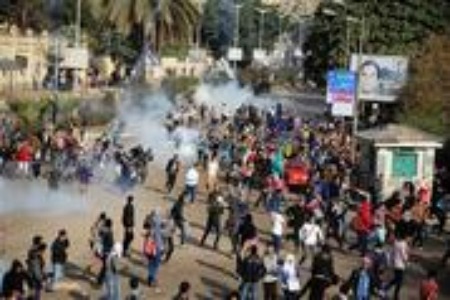
An overwhelming majority of Egyptians who voted on the country’s new constitution backed the draft charter, a senior Egyptian official said Thursday, despite criticism from an international monitoring group of a clampdown on free speech ahead of the election.
The election official told The Associated Press that unofficial results after most of the ballots had been counted indicated that more than 90 percent voted “yes” on the constitution.
He declined to give an estimate on the final turnout and spoke on condition of anonymity because he is not authorized to talk to journalists.
Nabil Salib, the head of the Supreme Election Committee, was quoted by the state news agency MENA saying that ballots were still being counted and that final results would be announced in a few days. He initially said the results were expected Friday. Results typically are announced within 72 hours after polls close in Egypt.
The vote held Tuesday and Wednesday was a milestone for Egypt’s interim government, installed by the military after a July coup toppled Islamist President Mohammed Morsi, following mass protests demanding that he step down.
Egypt’s interim Prime Minister Hazem el-Beblawi hailed those who voted for the constitution Thursday, saying: “Those who voted `yes’ were saying yes to building and saying no to all those who want destruction.”
Many considered the vote as key to restoring stability and supporting the current government in the face of continued opposition and protests from Morsi supporters.
Nine people were killed during clashes on the first day of voting. Thursday, students rallied outside the campus of the University of Cairo and fought with security forces. Police fired tear gas, pushing the students back and later arrested 23, authorities said.
An Interior Ministry statement said it later deployed forces to clear clashes on campus between pro- and anti-Morsi students and one student was shot and killed. It was not immediately clear who shot the student.
The draft constitution is a heavily amended version of a charter written by Morsi’s Islamist allies and ratified in December 2012 with some 64 percent of the vote but with a nationwide turnout of just over 30 percent. Morsi’s Muslim Brotherhood group and other Islamist groups boycotted this week’s referendum, calling it “illegitimate” and vowing to keep up protests.
The country’s second-largest Islamist group, the ultraconservative Salafis, largely stayed away from the polls. That left traditional Islamist strongholds across Egypt seeing only a trickle of voters during the two-day balloting.
By contrast, long lines formed outside polling stations in Egypt’s major urban areas and big cities, with crowds brandishing posters of the country’s military chief, as men chanted in support of the army and women ululated.
Such patriotic outbursts followed an intense campaign by the government and the overwhelmingly pro-military media, which portrayed the balloting as key to the nation’s security and stability.
In the weeks before the vote, hundreds of thousands of fliers, posters, banners and billboards urged Egyptians to vote “yes.” Security forces arrested people calling for a “no” vote.
Kol Preap, the head of a Transparency International mission that monitored the referendum, said in a report Thursday that while authorities had responded to “a deep desire by the majority of Egyptians to move toward a democratic path,” the political environment around the vote created “severe obstacles to advancing democracy.”
Preap cited “severe limits on the freedom of expression, association, and assembly” in the campaign ahead of the vote. His group had eight observers in 15 out Egypt’s 27 provinces.
“The political context in the run-up to the referendum impaired conditions to hold a free and fair referendum compared with international standards,” he said. Government actions such as arresting critics “undermined a level playing field for the promotion of diverse views.”
Local Egyptian groups that monitored the balloting said Thursday they had spotted some irregularities, such as instances of troops barring monitors from having access to the polling centers and the presence of pro-charter activists campaigning too close to the centers.
The interim government is looking for a strong “yes” majority and large turnout to win undisputed legitimacy and perhaps a popular mandate for the military chief, Gen. Abdel-Fattah el-Sissi, to run for president later this year. But silencing dissent has raised questions about the legitimacy of the process.
El-Sissi has yet to say outright whether he plans to seek the nation’s highest office, but his candidacy appears increasingly likely every day.
Amr Moussa, the head of the panel that drafted the constitution, told the pan-Arab daily newspaper Asharq Al-Awsat that he believes el-Sissi is making up his mind to run in the race.
“I believe that Gen. el-Sissi is likely to run” for president, he told the paper in an interview published Thursday. “We need a nationalist figure trusted by the people, one who we are sure will not take the country into an abyss.”
Following the referendum, Egypt’s Interim President Adly Mansour is expected to announce a change in the army’s transition plan and schedule presidential elections before the vote for the next parliament. This could give Egypt a new president before the summer.
Many Egyptians saw the referendum as a final blow to the Muslim Brotherhood and other Islamist parties, whose groups have dominated the past five polls since the country’s 2011 revolution and seemed positioned to be the country’s rulers for decades.
The privately-owned Al-Youm al-Sabea daily newspaper ran a mock, front-page death certificate Thursday for the Brotherhood, listing cause of death as “political stupidity and betrayal.”
The text also gave the location for the burial – “ballot boxes.” It was signed: “The Egyptian people.”